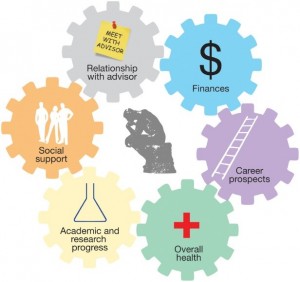To all graduate students across the tri-campus University of Washington community, we extend a warm welcome and welcome back! There is a definite buzz in the air, as everyone plans for grad school experiences, tasks and projects that lie ahead or are already in progress. And while we know that there will be demands on your time — including many opportunities to cultivate your interpersonal, academic and professional growth — we hope the following tips help you make the most of your grad school experiences in the coming weeks and months.
Acknowledge imposter syndrome (but don’t stop there). If you’re feeling that you’re somehow not smart enough or don’t have what it takes to succeed in graduate school, you are not alone. Many grad students experience what’s called imposter syndrome — feelings and self-talk that makes us doubt our sense of belonging, our strengths and talents, and our capabilities. And we can experience imposter syndrome in different ways, based on our various identities and backgrounds. But you know what? These doubts are simply not true. You are good enough, and you do belong here. Approach being in grad school like it’s a marathon, not a sprint, with goals and milestones that you can achieve one step at a time. Check out these tips for coping with imposter syndrome.
Connect with community. Being a grad student can feel isolating at times, especially when you have so many demands on your schedule. Yet this feeling of isolation doesn’t have to be the norm. Whether you are new to the UW or returning to your campus, seek out opportunities to build intellectual and professional relationships with peers both within and outside your department. You are also a whole person — not just a student — so we encourage you to allow space in your schedule to foster relationships with community beyond the UW based on your social and cultural identities, hobbies, faith or spirituality, and values.
One opportunity to connect with peers is at the Graduate Student Resource Fair on Seattle campus, scheduled for Thursday, October 18 (3–6 p.m.) in the HUB Lyceum and organized by the Graduate and Professional Student Senate (GPSS). Save the date and attend this event to learn about campus resources available to you and network with peers from across disciplines! If you’re staying for the reception, bring your ID and Husky ID. This event is open to all UW graduate and professional students.
Build a mentoring team. Invest the time to seek out and build your mentor team who can advise, guide and cheer you on as you work towards your academic, professional and interpersonal goals. We recommend that you build yourself a mentor team, because while no one mentor can support you on all levels, a team can. As this UW Graduate School resource page states, “While mentors can be faculty members, they can be your peers, advanced graduate students; departmental staff; retired faculty; faculty from other departments, colleges or universities; and professionals outside the university.” Having a mentoring team can make the difference between surviving or thriving in grad school. Check out these UW guides on finding the best mentors for you.
Best wishes on a great start to fall quarter!
Sincerely,
Core Programs—Office of Graduate Student Affairs
The Graduate School
